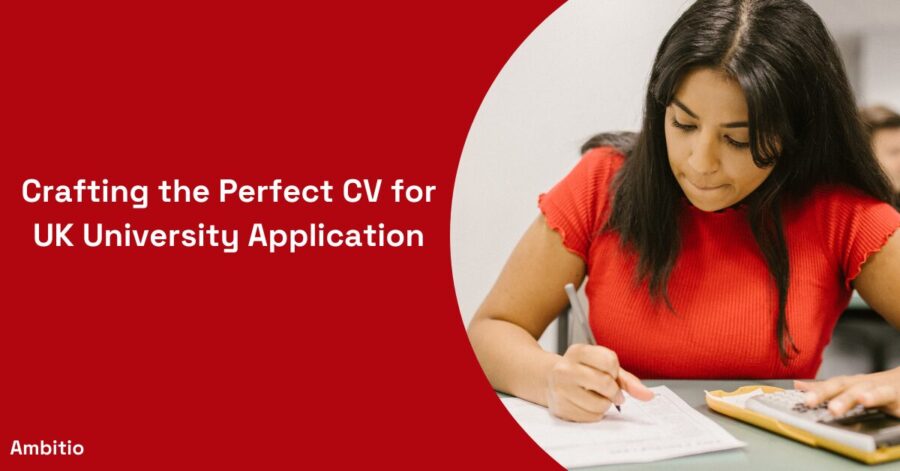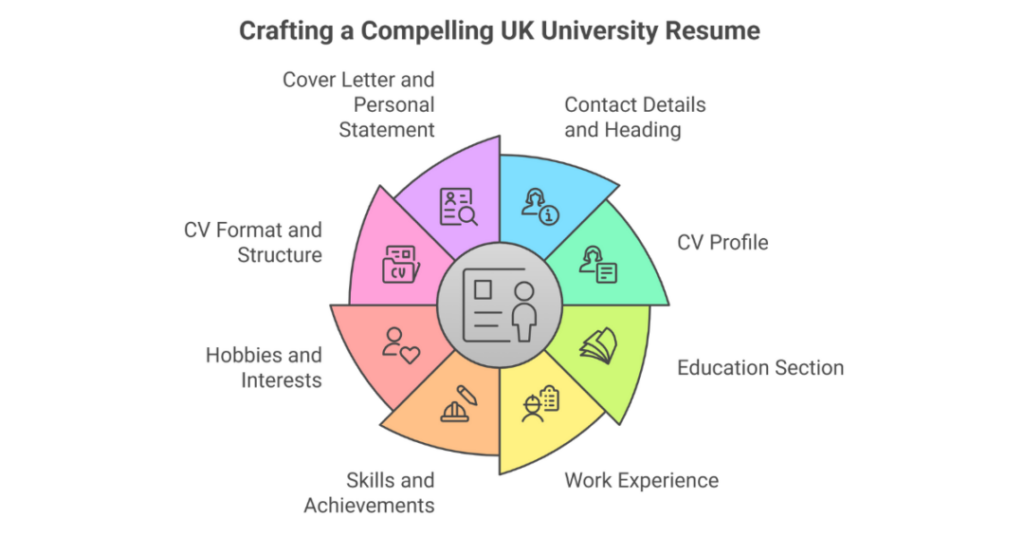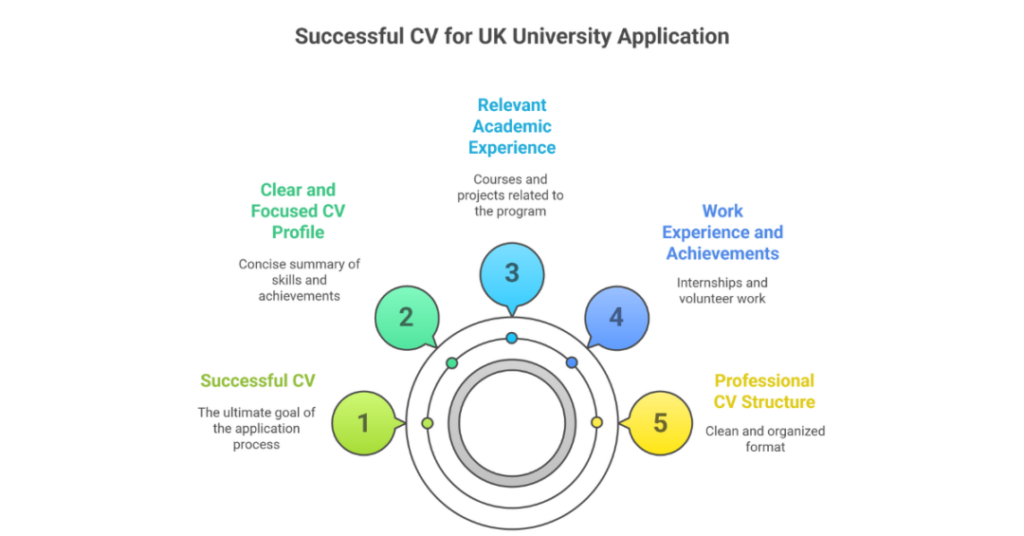19 June 2025
8 minutes read
How to Write an Effective Resume for UK University Application: A Guide for Indian Students

Key Takeaways:
- Resume for UK university application should be tailored to highlight relevant academic achievements, work experience, and skills specific to the program you’re applying for.
- Use a clear, professional format with key sections like contact details, education, work experience, and skills for an easy-to-read CV.
- A concise, focused CV profile sets you apart by showcasing why you’re the perfect candidate for the program.
Did you know that over 300,000 international students apply to UK universities every year? Yet, many struggle with crafting a standout CV. The reality is, a generic resume for UK university applications can get lost in the sea of hundreds of applications.
Especially when you haven’t tailored your CV to highlight your relevant work experience, academic achievements, and skills. To make a strong first impression, you need a structured, tailored CV format that showcases your strengths and aligns with the job description.
Understanding the Purpose and Importance of a Resume for UK University Applications
A well-crafted resume for UK university applications is crucial for standing out in a competitive environment. It’s important to highlight your academic qualifications, relevant work experience, and skills in a structured format that recruiters easily understand.
Tailor your CV with a clear chronological or reverse chronological order, showcasing internships, volunteer work, and academic achievements. Ensure the CV includes contact details, a concise CV profile, and a professional font. A sample resume for study abroad application may be the key to securing university admission and creating a lasting first impression.
Key Components to Include in Your Resume for UK Universities
When writing a resume for UK university applications, it’s essential to include key components that highlight your qualifications, experiences, and suitability for the course you’re applying for.

Your curriculum vitae should be tailored to the university’s expectations and use the best CV format for UK applications to make a strong first impression.
1. Contact Details and Heading
Include your full name, contact details, and location at the top of the CV. This ensures that recruiters can easily reach out to you. Keep the heading professional and clear to make a great first impression.
2. CV Profile
A brief CV profile summarizes who you are and what you bring to the table. It’s your chance to showcase your strengths, highlight your academic background, and mention your motivation for pursuing the course. This should be tailored to reflect your specific ambitions as an international student.
3. Education Section
The education section is critical in a university CV. List your academic qualifications in reverse chronological order, with the most recent first. Include your degree, institution, and any honors or academic achievements. This section helps universities assess your preparedness for the program.
4. Work Experience
A key component of your CV, especially for those applying for competitive university programs. Highlight relevant work experience, internships, volunteer work, or teaching experience. Use bullet points to showcase key achievements and responsibilities, making it easier for recruiters to scan.
5. Skills and Achievements
In this section, include both technical and soft skills. Whether it’s proficiency in a particular software, research capabilities, or leadership experience, it’s important to highlight these achievements in bullet points. Tailor your CV to show how these skills align with the course requirements.
6. Hobbies and Interests
Including hobbies or interests can help provide a well-rounded view of you as a candidate. Be selective and ensure they reflect the personal attributes that universities may value, such as teamwork, creativity, or leadership.
7. CV Format and Structure
Using a CV format for UK universities is essential. The best CV format includes sections in reverse chronological order, with a clear structure that allows recruiters to quickly see your qualifications, experience, and skills. Make sure to keep the CV concise, ideally within two pages.
8. Cover Letter and Personal Statement
While not part of the CV, a well-written cover letter, letter of recommendation, statement of purpose and personal statement complement your resume personal statement. Tailor these documents to reflect your passion, career goals, and reasons for choosing a particular course at a UK university. They can help reinforce your application.
By following these expert tips and using a tailored CV template, you can create a strong, effective resume for UK university applications that highlights your academic history, relevant work experience, and skills in the best possible light.
Example Resume/ CV format for University Application for UK Students
When applying to UK universities, your CV format plays a crucial role in making a lasting first impression. A well-structured and clear CV will highlight your academic achievements, work experience, and skills in a way that meets the expectations of recruiters.
Below is a CV example for UK university applications, specifically designed for students.
[Your Full Name]
[Your Address]
[City, Postcode]
[Phone Number]
[Email Address]
[LinkedIn Profile/Personal Website (optional)]
CV Profile
A concise summary highlighting your academic background, career goals, and why you are a strong candidate for the university program. Tailor this to the specific course you’re applying for.
Education
[Degree Name] | [Institution Name] | [Year Started – Year Ended]
- Achievements/Highlights (e.g., top grades, awards, etc.)
- Relevant coursework or projects related to your chosen program
[Previous Degree or High School] | [Institution Name] | [Year Started – Year Ended]
- Key achievements, such as high grades, relevant extracurricular activities
Work Experience
[Job Title/Internship Position] | [Organisation Name] | [Date Range]
- Responsibilities and key achievements, using bullet points to highlight specific contributions
- Any skills developed during the role (e.g., teamwork, communication, leadership)
Skills
- Technical Skills: [e.g., Programming languages, Software proficiency]
- Soft Skills: [e.g., Communication, Leadership, Teamwork]
- Languages: [List any languages spoken with proficiency levels]
Extracurricular Activities and Volunteer Work
[Position] | [Organisation Name] | [Date Range]
- Description of your role and impact (e.g., managed events, mentored others, community outreach)
Hobbies and Interests
- Briefly mention activities that reflect your personality, skills, and passion. Ensure they are relevant to your application and demonstrate well-roundedness.
References
Available upon request.
This example resume for UK university application follows a reverse chronological CV format, which ensures that your most recent academic qualifications and work experiences are highlighted. Keep it simple, concise, and tailored to the university program you’re applying to, making sure to focus on the most relevant details.
5 Tips for Tailoring Your Resume to Specific UK University Requirements
Tailoring your resume for UK university application is crucial for standing out in the competitive admissions process. A generic CV won’t capture the attention of recruiters or university admission teams.

By customizing your student CV to highlight the most relevant qualifications, skills, and experiences, you can ensure your CV aligns with the specific requirements of each program. Here are five expert tips for making your CV for UK university shine:
1. Focus on Relevant Academic Experience
Tailor your academic CV to showcase courses, projects, and research related to the program you’re applying for. This highlights your preparedness for the course and makes your CV more attractive. If you’re applying for an academic job or further studies, this section should demonstrate your intellectual depth and curiosity.
2. Highlight Work Experience and Achievements
Whether it’s internships, volunteer work, or part-time jobs, work history can significantly strengthen your application. Ensure that your work experience section emphasizes how the skills and responsibilities gained align with your academic and professional goals. This not only gives insights into your skills but also shows your skills and experience in real-world settings.
3. Tailor Your CV Structure for the UK
The format for the UK often requires a simple yet professional design. Use clear headings, bullet points, and sections that are easy to navigate. Keep your resume for abroad studies format clean, making sure the CV structure includes key sections like contact details, education, work experience, and skills section. Avoid clutter and ensure that your CV does not take up too much space, sticking to a maximum of two pages.
4. Include a Clear and Focused CV Profile
The CV profile is your chance to sell yourself. Write a concise summary of your skills, focusing on what makes you the perfect candidate. Tailor this section to reflect the skills and accomplishments that align with the program’s requirements. It’s important to get this right as it’s one of the first things recruiters or admission officers will read.
5. Use a CV Builder or Template to Stay Professional
Using a CV builder or a CV template can help ensure your CV for university application is professionally structured. This ensures that you don’t miss any key sections like the skills section, education, or work history, and helps you organize your CV effectively. A well-organized CV makes a great first impression and significantly improves your chances of getting noticed.
By following these tips and focusing on the right CV format for UK university applications, you can create a successful CV that will increase your chances of making it through the university admission process. Remember, a tailored CV for UK university applications is your key to success.
How to Format and Design Your Resume for Maximum Impact
When writing your resume for UK university application, the format and design play a crucial role in making a strong first impression. A well-structured and visually appealing CV can significantly improve your chances of being noticed by recruitment teams. Here’s how you can create a CV that highlights your strengths and aligns with UK CV standards:
1. Start with Clear and Professional Contact Information
Make sure your name and contact details are placed at the top of the CV. This is essential for recruiters to quickly reach out to you. Keep this section simple and clear, with no unnecessary information.
2. Use the Right CV Structure and Format
The structure and format of your CV are key to making it easy to read. Ensure that your CV has distinct sections such as employment history, education, and skills section. Use bullet points to make each section concise and easy to scan, ensuring the CV is different from others.
3. Tailor Your CV to the Job
Tailored to the job is crucial. Highlight your most relevant skills and experiences that fit the job application or academic program. This shows that you understand the suitability for the role and are a good match for the program or position.
4. Include Key Sections of Your CV
Certain sections of your CV are essential. Make sure you include the following: your education, employment history, skills section, and a CV profile. This helps provide a well-rounded view of your qualifications and experience, ensuring the CVs needs are met.
5. Highlight Your Skills
It’s important to highlight your skills in the skills section. This allows you to show not just what you’ve done, but also what you can bring to the table. Include both hard skills and soft skills relevant to the job application or academic program.
6. Finish with a Strong End
The end of the CV is just as important as the start. Make sure you provide any additional information that may be relevant, such as certifications or references. Keep it simple and avoid unnecessary details.
7. Keep It Simple and Easy to Navigate
A simple CV design is often the best choice. Ensure that the CV is visually clean and easy to read. Avoid heavy graphics or complicated layouts, as it might distract from the content. A clear, concise design will create a good impression on recruitment teams.
By following these tips and focusing on a clean, professional CV format for UK universities, you can create a CV that highlights your qualifications and maximizes your chances of success. Remember, writing your CV properly and tailoring it to the job is the best way to stand out in a competitive environment.
Conclusion
Crafting the perfect CV for UK university application is essential to showcase you as the perfect candidate. Focus on what your CV needs, what you need to include, and ensure it must be easy to read while highlighting your skills and qualifications. A well-organized CV with the right sections will set you apart.
At Ambitio, we specialize in profile building to ensure you stand out to top universities. Whether you’re interested in developing your academic or professional profile, Ambitio is here to help you pick the best strategy. Join us today to get started on your journey to success!
FAQs
What should I include in the education section of my CV?
Include all your relevant qualifications, starting with your most recent and working backward in reverse chronological order. Include the name of the institution, the dates you attended, the qualification you received, and your grades.
How can I showcase my skills on my CV?
Include a skills section on your CV and list your key skills that are relevant to the course or program you are applying for. Be sure to include any transferable skills you have developed through your academic or work experiences.
Should I include references on my CV?
It is not necessary to include references on your CV unless the university specifically asks for them. If you are asked to provide references, make sure to ask your referees for permission before including their contact details on your CV.

You can study at top universities worldwide!
Get expert tips and tricks to get into top universities with a free expert session.
Book Your Free 30-Minute Session Now! Book a call now




























